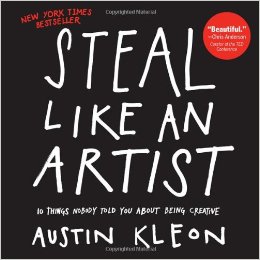As an academic or as someone who enjoys writing to discover new trends and patterns, I view my quest to come up with research ideas as a creative endeavor. I also associate being creative requires an entrepreneurial spirit — with the difference being that a real entrepreneur invests capital in some form to get returns, while a scientist or a writer has to invest his or her time to come up with ideas that might bear a return or not, depending on whether that research gets funded or whether that idea makes it into a fine editorial piece or not.
If you view that your work requires some degree of creativity, then Steal like An Artist is just a less than 100 pages book that would inspire you to develop some principles in your pursuit of creative ideas. Interestingly, the entire book consists of cartoons/graphics with short notes around different principles that the author recommends.
The three principles that resonated with me the most are:
- Start from the mundane to make something extraordinary: Often we are trying to think “outside the box”. But one has to be inside the box first and be able to see things from multiple perspectives before one can step outside the box and see a different paradigm. The book discusses examples of successful artists and painters and singers who first emulated their role models and in the process by doing so, they found their distinct identity. Drawing a parallel to this, as a researcher or scientist, this could be following an existing method applied by several others in the field; then identifying a flaw in it or a marginal improvement that adds one’s distinct identity and viewpoint, to produce something new.
- Go unwired from technology: I really love this because it is so easy to get swamped in the flood of information at a click of a mouse and multiple tabs open in your browser. As a researcher when I want to come up with new ideas, I like to stay away from screen and draw mind maps around a central theme that I would like to explore. By doing so I am often able to discover what I already know on the topic, or the different areas that I’d like to explore around the topic, and if nothing then at least it gives me a structure around the idea that I need to build on my writing or my search query in Google scholar. Similarly, when I already have a lot of information, I again step back from the screen, and do the same exercise – in this instance, to develop a coherent structure around all the information that I already have and then use my laptop to type it.
- Go on a creative date everyday and consistently: All creative work is a pile up of “boring”, “mundane” tasks performed consistently to make something extraordinary. I agree to this by far the most because consistency is the most important principle in writing or solving a problem. There are several days when we feel we are being “unproductive”, but being consistent in working on it is the only way to get a breakthrough. As Woody Allen said that success is about 80 percent just showing up.
